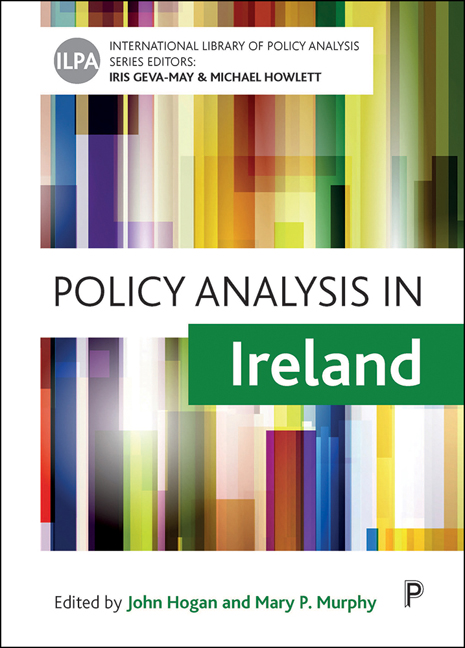Book contents
- Frontmatter
- Contents
- List of figures, tables and boxes
- List of abbreviations
- Notes on contributors
- Editors’ introduction to the series
- Acknowledgements
- Foreword
- Preface
- one Contextualising policy analysis in Ireland
- Part One: History, styles and methods of policy analysis in Ireland
- Part Two: Policy analysis at various levels of government: from local to the EU
- Part Three: Think tanks, interest groups, political parties and gender-based policy analysis
- Part Four: The public, science and the media: the wider policy analysis environment in Ireland
- Index
ten - The social partners and the NESC: from tripartite dialogue via common knowledge events to network knowledge
Published online by Cambridge University Press: 18 December 2021
- Frontmatter
- Contents
- List of figures, tables and boxes
- List of abbreviations
- Notes on contributors
- Editors’ introduction to the series
- Acknowledgements
- Foreword
- Preface
- one Contextualising policy analysis in Ireland
- Part One: History, styles and methods of policy analysis in Ireland
- Part Two: Policy analysis at various levels of government: from local to the EU
- Part Three: Think tanks, interest groups, political parties and gender-based policy analysis
- Part Four: The public, science and the media: the wider policy analysis environment in Ireland
- Index
Summary
Introduction
This chapter discusses policy analysis within institutions created by the state to involve the social partners in the policy process, particularly the National Economic and Social Council (NESC). From the mid-1980s, a method of policy analysis was developed in response to the pressures of interest group dialogue and the economic, social and environmental problems under discussion. Over time, international thinking and practice in post-positivist social science and policy analysis provided a language to describe NESC practice and, in some ways, inform the approach. This is noted as each phase of the approach to policy analysis is described.
The section following this introduction opens with a sketch of the changing institutional landscape in which policy analysis involving the social partners took place. It then notes the NESC's early work and highlights its view that technical analysis could not be expected to resolve the differences within it, which reflect divergent beliefs, ideologies and interests. The chapter then describes a significant change in the role, method and perspective after 1986. This involved policy analysis based on framing and reframing to create a series of ‘common knowledge events’. A further iteration is then outlined – the move to policy analysis in support of multi-actor, multi-level engagement in the mid-1990s. Faced with complex supply-side challenges – as well as puzzles and doubts about the possibility, nature and location of cooperation between organisations with divergent values and interests – the NESC found in pragmatist thinking an account of how the ‘inner workings of cooperation’ and analysis can support joint action. The penultimate section describes the move towards co-production, network knowledge and the NESC's adoption of the environmental sustainability agenda in the years from 2008 to the present. In thinking about its position, role and method, the NESC secretariat recognised its role as a ‘boundary organisation’, managing the relationship between policy analysis and diverse actors. The final section reflects on the overall evolution of policy analysis, identifying elements of continuity and change. There were significant similarities between the changing use of policy analysis in interest group dialogue in Ireland and in other countries, especially the Netherlands, despite differences in the wider systems of policy analysis and interest group mediation. The changes in method of policy analysis were largely cumulative; the earliest approach – engaging the social partners in discussion of mainstream social scientific analysis and evidence – was never abandoned.
- Type
- Chapter
- Information
- Policy Analysis in Ireland , pp. 141 - 156Publisher: Bristol University PressPrint publication year: 2021



